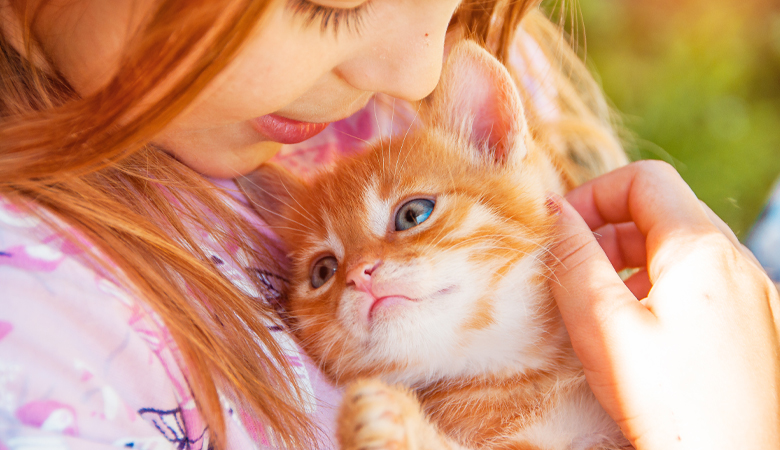Socialising Kittens
Written by |
Cats are one of the most popular choices for pets. The People’s Dispensary for Sick Animals (PDSA) shows that about 24% of UK adults or households have a cat.

Sure, some cats are very mischievous, but overall they are relatively easy to maintain and therefore suitable as a pet for many people. From a special cat breed to a European shorthair, you are sure to get a lifelong companion.
If you are thinking about getting a kitten, you might want to read our articles on Buying a Kitten and Litter Training. If you’ve already decided to get a kitten, you’ll have to make sure you properly socialise and raise your new friend. Just like humans, young cats are very impressionable and tend to be shaped by their experiences in the early stages of life. A well-behaved and socialised kitten is curious, happy, and relaxed. If your kitten is easily scared, sad or nervous, it is very likely that something went wrong during the socialisation period. In this article you can read about the importance of socialisation and how you can socialise your own kitten.
The socialisation period
The socialisation period refers to a specific time period in the learning process of young kittens. In this period, kittens will learn how to behave around other animals and people, how to use the litter box, or how to deal with being handled by humans. As kittens will learn how to get used to objects as well, this is also the ideal time to acclimatize them to travelling in a carrier.
The first socialisation period usually occurs while your kitten is still at the breeder. This is when a kitten is between 3 and 8 weeks old. A second socialisation period occurs between the 8th and 14th to 16th week.
Thanks to proper socialisation a cat will be able to deal with new situations more easily, while it will also lessen the risk of your cat being anxious later in life. If a cat hasn’t been socialised properly, it may suffer from stress or anxiety. In the long run, this could seriously affect your cat’s health. If you’re looking for objects you can use to train your kitten during and after the socialisation period, you can check out all our daily supplies and toys for kittens.
When can you take your kitten home?
At what age you can take your kitten home, heavily depends on the breeder and laws in your country. In April 2020, a new law has come into effect regarding the welfare of puppies and kittens in the United Kingdom. Lucy’s Law is a regulation that states that licensed commercial traders are no longer allowed to sell puppies and kittens if they are less than 6 months old. As for non-commercial traders, there are no specific rules. In any case, cat experts recommend cats to not leave the queen until they are 12 to 13 weeks old, or to wait until they are at least 8 weeks old.
Unfortunately, some kittens do leave their mother much earlier. This often happens due to breeders lying about the kittens’ age. Fortunately, there are websites with charts and pictures of kitten’s age, like alleycats.org. On these websites you can compare the age progression of kittens to the information from the breeder, to make sure you don’t take a kitten home too early.
Licensed breeders often won’t let you take a kitten home before they are 12 to 13 weeks old. In this case, the first and the majority of the second socialisation phase will be over before you take the kitten home. Of course, you do want the breeder to spend enough time on the socialisation of your kitten. That is why it is important to stay informed during the adoption process and to check up on your kitten regularly (or as often as the breeder allows).
The role of the queen
The mother cat, also known as the queen, plays a huge role in the socialisation process. If a queen has been properly socialised herself, she will teach her kittens all about normal, healthy and good cat behaviour. For instance, if the queen reacts well to being handled by humans, a kitten will learn that humans aren’t scary. The queen will also teach boundaries for playing by correcting the kittens if their biting and scratching gets too rough.
Your kitten at home
Once you finally get to take your kitten home, you will need to keep paying attention to socialising and raising your cat. Some people say cats can’t be raised or trained, but nothing is farther from the truth! Cats can be taught to behave, as long as you remain consistent in your teaching. By correcting bad behaviour each time you see it, you can teach your cat not to scratch the furniture or prevent it from jumping on the table.
Cat owners usually achieve the best results by rewarding good behaviour. Provide alternative objects or surface that your cat is allowed to scratch or sit on, like toys or scratching post. Never use physical punishments, as these can actually worsen the behavioural problems.
Start training your cat step-by-step and keep an eye on your cat’s behaviour. And try to approach new situations and objects with a positive mindset. If you stay calm and positive, your cat is more likely to see the training as a positive experience as well.
Last but not least
Make sure you don’t overload your kitten with stimuli. While bad behaviour should be corrected, too many bad experiences can make your cat feel anxious. Make sure your cat has an exciting, stimulating environment that prevents boredom, but don’t fill the room with too many items. And even though training might seem hard, don’t get discouraged: good socialisation will be the basis of a happy life with your cat!



